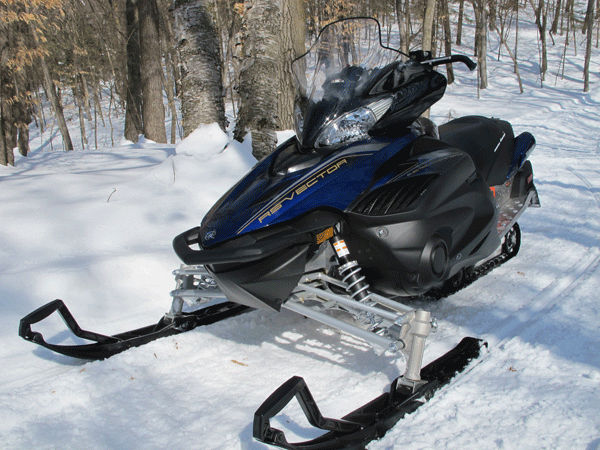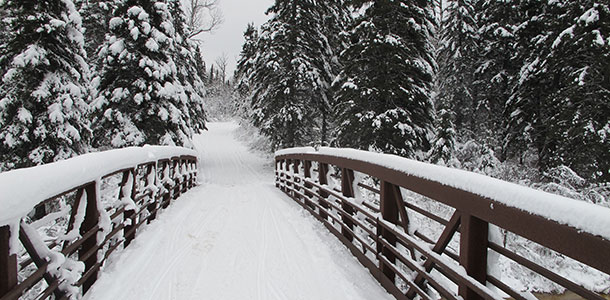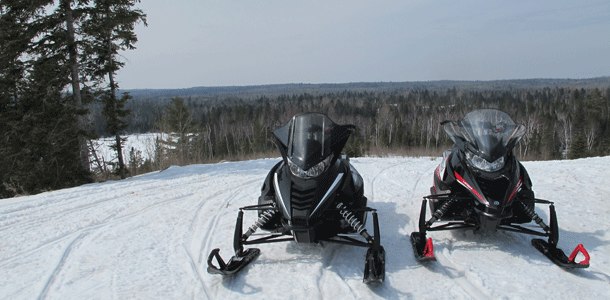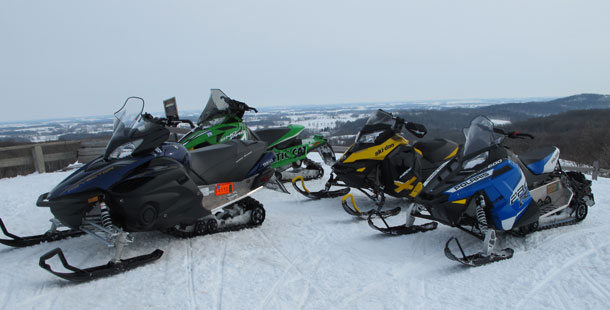 The Yamaha RS Vector has been an intrepid member of the Yamaha snowmobile lineup since 2005 when it came out as a less-potent version of the RX-1. Always a comfortable trail cruiser, the RS Vector has evolved over the years to remain a (mostly) modern trail runner.
The Yamaha RS Vector has been an intrepid member of the Yamaha snowmobile lineup since 2005 when it came out as a less-potent version of the RX-1. Always a comfortable trail cruiser, the RS Vector has evolved over the years to remain a (mostly) modern trail runner.
It moved over to the Yamaha Deltabox II chassis in 2008 to catch up with current styling and gain a more upright rider position. Two years later it picked up fuel injection and another 76 cubic centimeters with a new 1049cc, three-cylinder engine. In 2012 it inherited electric power steering, and finally for 2013 it received minor updates to the skis and windshield. A 2013 Yamaha RS Vector was part of the Snow Goer test fleet, and this is a review of that machine.
We’ve long known that the RS Vector is a really good snowmobile for comfortable trail riding — it’s made the Snow Goer Top 10 sleds list in seven of the past nine model years — and we’ve had a lot of experience with this chassis, so we thought there we no surprises left. But one particular late-season ride and a fresh perspective from an outsider gave us new insight on this time-tested snowmobile.
It was the third week of April, but winter was hanging on in the home state of Arctic Cat, Polaris and Snow Goer magazine. The Arrowhead Region of Minnesota had received 2 to 3 feet of snow the day before this ride, and even though snowmobile trails usually close on April 1, some trails managed by the State of Minnesota were still open. “Enjoy it while it lasts” is what the Minnesota Department of Natural Resources website said about the C.J. Ramstad North Shore State Trail.
The trail was rough, but fortunately for us and the few dozen other snowmobilers who also went for a late-season rip, the snow hadn’t packed down yet, so those big bumps still had some cushion when our skis and tracks slammed into them.
The Vector managed the soft bumps and loose moguls of the ungroomed trail surprisingly well — better than we ever remember this platform performing — and handling was good. The low-slung chassis cornered flatly, reminiscent of machines built a decade ago that sat closer to the ground and carved effortlessly. Whether it was the density of the snow, the spacing of the bumps or our mood, we’re not sure what made the RS Vector perform so admirably that day, but it was a blast to drive on the bumpy trail. It struggled when we forced it through 3 feet of powder on a Forest Service road. RS Vectors belong on the trail.
Engine power is in the same class as the 600cc two-strokes — maybe a horse or two more — and it makes the RS Vector impressively quick. The acceleration curve is smooth, strong and fun when riders become more liberal with throttle input. This versatile powerplant can make the machine go like hell if riders want it to, or cruise slowly and smoothly all day for a relaxing ride.
Our fresh perspective came from Chris Riley, a 49-year-old former snowmobile lake racer. Riley calls himself an old-school snowmobiler because he cut his riding teeth in the 1970s. He’s a friend, snowmobile racing journalist and longtime enthusiast, though he doesn’t currently own a snowmobile. A ride with the Snow Goer staff in February was his first on a four-stroke snowmobile, and he entered the experience skeptical. He left, however, impressed — saying there wasn’t a single thing he would change about the RS Vector.
A former owner of a 2002 Ski-Doo based on the ZX chassis, Riley likes to ride with his legs and arms out front rather than the upright position that rider-forward chassis promote. The Yamaha RS Vector reminded Riley of his old trailing arm-suspended Ski-Doo. He connected right away with the low-slung, corner-carving Yamaha because it was more comfortable in terms of how the sled is laid out. “It’s a great, modern interpretation of older ergonomics that will feel familiar to people who started riding in the 1970s or ’80s,” he said.
Whenever Riley squeezed the throttle on the Yamaha RS Vector, it responded, he said, describing the powertrain’s delivery as linear with a smooth grunt like an electric motor. “All the way through it’s pulling. You don’t have to wind it up to get it to pull,” he said. “Corner-to-corner acceleration was great. There’s plenty of power.”
Other notes from Riley are that he was pleasantly surprised for how light the 2013 RS Vector felt with power steering. Traction and weight transfer to the rear suspension was well balanced and it was clutched spot-on. The cool snarl from the rear-exit exhaust sounds tough. “Yamaha got it right,” Riley said. “It’s perfect for a guy in his late 40s who used to be a hot rod in his 20s.”
Sled: 2013 Yamaha RS Vector
MSRP: $11,899
Modifications: None
Miles ridden: 570
Weight: 672 pounds, stock, full gas
Average MPG: 15.26




